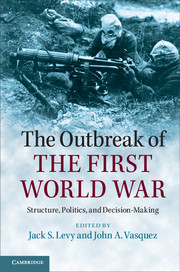Book contents
- Frontmatter
- Dedication
- Contents
- List of figures
- List of tables
- List of contributors
- Preface
- Part I Overview of debates about the causes of the First World War
- 1 Introduction
- 2 July 1914 revisited and revised
- Part II Structure and agency
- Part III The question of preventive war
- Part IV The role of the other powers
- References
- Index
- References
2 - July 1914 revisited and revised
The erosion of the German paradigm
Published online by Cambridge University Press: 05 July 2014
- Frontmatter
- Dedication
- Contents
- List of figures
- List of tables
- List of contributors
- Preface
- Part I Overview of debates about the causes of the First World War
- 1 Introduction
- 2 July 1914 revisited and revised
- Part II Structure and agency
- Part III The question of preventive war
- Part IV The role of the other powers
- References
- Index
- References
Summary
“Austrian Fear of Serb Empire is Real War Cause,” wrote Harvard historian Albert Bushnell Hart in the Sunday New York Times on August 2, 1914. Two days later Germany launched its invasion of Belgium. Within weeks Hart’s view would be eclipsed by the emergence, in Britain, France, Russia, and the United States, of the paradigm of full German responsibility for the Great War. Only now, close to a century later, is that paradigm in the process of erosion, though some historians in the 1920s sought to challenge its prominence. Recent research shows a more culpable Serbia, a more aggressive Franco-Russian alliance, a more desperate Austria-Hungary, a more assertive Russian foreign policy, a more ineffective Britain in its efforts to contain the crisis, and internal tensions among all the powers on the eve of Sarajevo. Germany remains central to any explanation of the origins of the war, but it is now joined by other powers and other considerations. The paradigm no longer dominates the discussion; indeed, Hart’s assessment of August 2, 1914, now possesses new credibility. This chapter will track the emergence of the German paradigm and the numerous recent challenges to it. It will then suggest further areas for research on the continuing question: why did war come to Europe in the summer of 1914?
The German paradigm
The unprovoked German attack on Belgium, quickly followed by murderous reprisals against civilians and the destruction of the famed University of Louvain, soon caused the Triple Entente powers and the United States to see Germany as the prime mover behind the war. They believed the Germans had deliberately launched the war. That view gained reinforcement with the sinking by a German submarine of the RMS Lusitania on May 7, 1915, and the loss of 128 American lives. Months of tension between Washington and Berlin, the resumption of unrestricted submarine warfare in January 1917, and the maladroit Zimmermann telegram seeking to entice Mexico to attack its neighbor further hardened American views. Once the United States entered the war, many American historians actively joined the cause of blaming the Germans for the war, with an occasional nod to Austria-Hungary.
- Type
- Chapter
- Information
- The Outbreak of the First World WarStructure, Politics, and Decision-Making, pp. 30 - 62Publisher: Cambridge University PressPrint publication year: 2014
References
- 6
- Cited by

